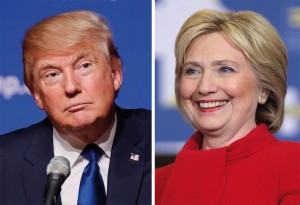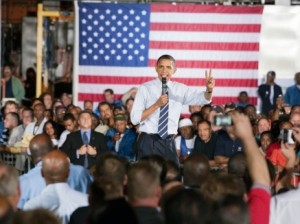
Whether it's Trump or Clinton in the White House, the next president will face some tough decisions related to the auto industry.
With the polls narrowing, it could be a nail-biter on par with the World Series finale in determining who will be America’s next president. But whoever winds up in the Oval Office next January will be facing a wide array of challenges, many of which will significantly impact the U.S. auto industry.
Few industries are more tightly regulated. And even governments actions not directly involving issues like emissions, safety and fuel economy could have a broad impact. That’s all the more the case considering that, in the words of General Motors CEO Mary Barra, the auto industry is facing “more change in the next five to 10 years than it has in the last 50.”
The auto industry has found itself in the crosshairs on several occasions, most notably with Ford Motor Co. taking heat from Republican presidential candidate Donald Trump for its plan to move all of its small car production to Mexico. So, NAFTA and the Trans Pacific Trade Partnership will be on the next president’s desk, along with issues like fuel economy, and global warming.
“From the auto industry’s perspective,” the election “is really, really important,” said David Cole, director-emeritus of the Center for Automotive Research, a private think tank.
“Probably the most important issue will be getting the economy growing at a reasonable rate,” he said. The relatively low rate of growth is “a terrifying problem.”
That’s all the more concerning to the industry as it watches the U.S. new-car market soften after reaching historic sales highs. There are few signs that a sharp downturn is on the horizon – certainly nothing of the magnitude that faced then-new President Barack Obama when he took office in January 2009, but even a more modest economic slowdown could have dire consequences, industry experts warn.

President Barack Obama faced significant challenges in trying to help the auto industry rebound from the recession at the start of his presidency.
The health of the economy is tightly interwoven, in today’s global economy, with trade. That’s especially true with the auto industry. Candidate Trump has raised concerns about the transfer of automotive production from the U.S. to Mexico. And there is no question that the auto industry has been booming “South of the Border.” But whether that actually has hurt the U.S. auto industry jobs base is far from certain, as Ford Chairman Bill Ford stressed during a meeting with the Republican candidate.
If anything, there has also been a boom in automotive manufacturing during the last decade or more. Not only have Detroit’s Big Three makers created tens of thousands of jobs since the end of the Great Recession, but also there have been major investments made by foreign-based companies, from giants like Japan’s Toyota to Germany’s Volkswagen. Even Volvo is setting up a new, $500 million plant near Charleston, South Carolina.
“Ironically, our cost position is improving,” said Cole, which actually is encouraging more localized automotive production.
CAR’s Cole and others warn that any measures that limit free trade could ultimately hurt the auto industry, as well as the broader economy. While the GOP nominee has been more vocal in his trade stance, both Trump and Democratic rival Hillary Clinton now oppose the TPP and have made commitments to take steps to revise NAFTA and other trade agreements.
(Presidential campaigns court auto industry vote in waning hours. Click Here for the story.)
But a wholescale crackdown on trade “would be disastrous and will hit the auto industry, in particular,” warned Professor Marina Whitman, a retired General Motors executive vice president who now serves as a professor of business administration and public policy at the University of Michigan.
Tax policies are yet another area that could impact the industry. Like other businesses, automakers would like to see a reduction in corporate rates and other changes that could reduce their tax burdens.
One area of interest to the auto industry where the two candidates seem most sharply divided concerns global warming. The GOP candidate has gone as far as claiming the issue is a fiction created by China, his Democratic opponent has said climate change is an issue America must address quickly.
Their opposing stances could, in turn, influence government policy on topics like fuel economy and automotive emissions. The Environmental Protection Agency recently showed it likely will move ahead with the tough, 54.5 mpg mileage mandate for 2025. Many automakers had hoped for a rollback, something a GOP White House might consider more favorably. On the other hand, there’s growing support in the auto industry for electric vehicles, a shift the Democrats favor.
Under President Obama, federal regulators have cracked down hard on industry safety lapses. But guided by National Highway Traffic Safety Administration chief Mark Rosekind, there’s also been an unprecedented shift to cooperate on the development of high-tech safety systems. Rosekind has also promoted the development of autonomous vehicles. Carmakers are hoping this is one thing that doesn’t change under the next president.
(Clinton or Trump: Change coming to auto industry. Click Here for more.)
Technology is rapidly changing the auto industry. The new Commander-in-Chief will have to consider such issues as infrastructure. Beyond rebuilding roads and bridges, that could include the creation of a new, nationwide connected vehicle network, something proponents say could enhance safety and improve traffic flow in clogged megacities. Mass transit will be another topic the new president will have to consider.
But not all the issues facing the auto industry are high tech. True, automation has helped cut by more than half the number of workers needed in a typical assembly plant. But muscle still matters. The difference is that there’s less demand for the sort of unskilled laborers that long manned the line. Even hourly workers need to know some fundamentals about issues like quality control.
If anything, there’s actually a shortage of the skilled and semi-skilled labor the industry says it will need in the years ahead. Former Secretary of State Clinton has frequently talked about the need for European-style crafts training and apprenticeship programs.
The complexity of the issues facing the auto industry may help explain why auto industry executives have been far more nuanced this year in terms of their support for the two presidential candidates. Neither Trump nor Clinton are seen as clearly in the industry’s corner. And each could bring to the White House issues that could hurt the economy, and thus the auto industry.
Watching the way financial markets have responded to the idea of a President Trump doesn’t bode well for the economy, especially if there’s a crackdown on trade, said Whitman. But she is equally concerned what would happen with a President Clinton, especially if Congress stays in the hands of the Republicans, something that could “lead to stasis,” four years of getting little to nothing done in Washington.
(Trump, Ford Motor Co. tussle over Mexico. For more, Click Here.)
“People are saying it will all be over after Tuesday,” said the long-time auto industry veteran. But for the car business, in particular, she added, “Actually, it will just be starting.”
(This story originally appeared on NBCNews.com.)
